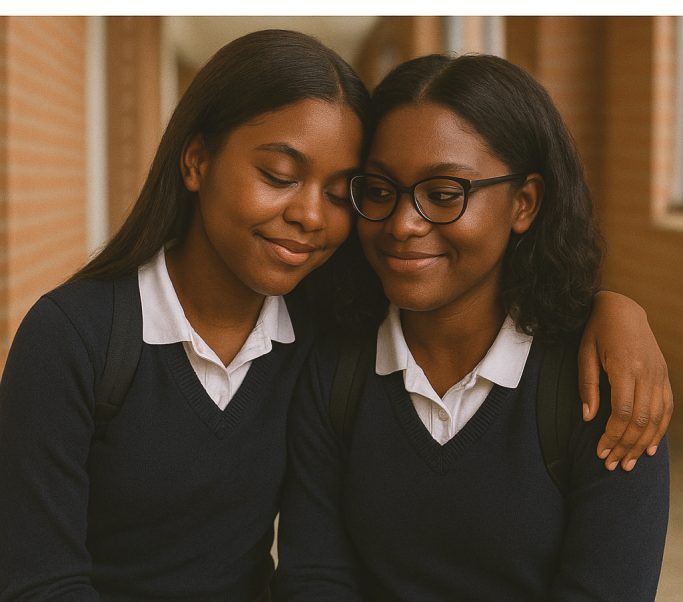In the delicate terrain of human relationships, few things are more confusing than realizing that a friend’s affection may run deeper than you thought. Sometimes, a girl’s warmth, attention and closeness toward another girl may feel charged with something beyond friendship. In whispered corners or online chatter, some might crudely describe this as “trying to recruit someone to be a lesbian.” But that phrase is misleading and unfair. Sexual orientation is not a club people are invited into – it’s an inner truth people discover and live out.
No one can be converted into or persuaded to adopt a sexual orientation. What actually happens in such situations is that one person expresses genuine affection or curiosity, hoping the other might feel the same. To label that as recruitment is to misunderstand both attraction and human connection.
Still, understanding the difference between deep friendship and romantic interest can help one respond with maturity and empathy. When a girl seems especially drawn to you, certain behaviors may stand out. She might constantly look for reasons to be around you, whether through texts, calls or casual hangouts. Her attention may feel more focused than what ordinary friendship demands. Compliments about your looks or the way you carry yourself may come more often, touching on physical features or charm rather than general traits like kindness or intelligence.
You might also notice her desire for closeness – sitting beside you whenever possible, touching your arm during conversation or finding excuses for small gestures of affection. Some people are naturally touchy, but when physical contact becomes regular and emotionally charged, it can signal attraction. Emotional vulnerability often follows. She may open up about her past, her struggles or even her orientation, watching how you respond. Sometimes jealousy slips in when you talk about a male friend or a boyfriend. These are not guaranteed signs of romantic intention but they can suggest that the friendship carries deeper feelings for her.
Flirtation can appear in small, almost invisible ways – long eye contact, playful teasing or humor that hints at intimacy. What feels like friendship to you might feel like emotional connection to her. Yet, even with all these cues, it’s important not to rush into assumptions. Cultural, personal and temperamental factors influence how people show affection. Some women express warmth and admiration without romantic motives. The only way to know the truth is through honest, kind communication.
If you feel confused or uncertain, an open conversation is often the most mature route. You could say something like, “I really value our friendship, but sometimes I’m not sure how to interpret certain things between us. I just want to be clear so we both understand each other.” This shows care, not confrontation. It gives both of you space to be honest without shame or awkwardness.
If she confides that she does have romantic feelings and you do not share them, you can still respond with respect. Saying, “I care about you as a friend, but I don’t see our relationship in that way,” draws a clear line while preserving her dignity. Avoid gossip or ridicule – these moments of honesty make people vulnerable, and the worst thing one can do is use that trust against them. If you value the friendship, reassure her of that. If you need distance to stay comfortable, it’s okay to create space. Boundaries, when set kindly, protect both sides.
The way you handle such a situation says a lot about your character. It’s possible to decline romantic interest without rejecting the person. In many societies, same-sex attraction still attracts stigma and silence. A girl who dares to share her feelings with another girl takes a significant emotional risk. Meeting that courage with ridicule or disgust reinforces shame. Meeting it with empathy, even when you cannot reciprocate, strengthens mutual respect.
READ ALSO:
Kwale activist calls for equal bursary access and support for learners with Autism
Ultimately, moments like these invite reflection. They challenge you to think about your comfort zones, your understanding of intimacy and how you define friendship. A relationship that survives such honesty often becomes more genuine, because it’s grounded in truth rather than misunderstanding. Sometimes, both people walk away wiser – one having expressed her feelings bravely, and the other having learned the value of compassion.
Attraction, whatever its form, is part of the human condition. It should not be feared or ridiculed. Responding with calmness and kindness ensures that no one walks away humiliated or diminished. The issue is not about who might be trying to “recruit” whom; it’s about how we handle real emotions when they surface unexpectedly.
There are no tell-tale signs of recruitment because love is not a campaign. What may feel like persuasion is often someone’s genuine attempt to connect or express admiration. In the end, what matters most is how we treat one another when feelings become complicated. Choosing empathy over mockery, clarity over confusion and resect over panic is the mature way to navigate such delicate situations.
Love, whether returned or not, deserves to be treated with dignity. Friendships may shift, feelings may fade and emotions may evolve – but how we handle them reflects our humanity. When friendship feels different, understanding and kindness are the best guides. They remind us that every human heart, regardless of orientation, simply seeks recognition, respect and the grace of being understood.
By Ashford Kimani
Ashford teaches English and Literature in Gatundu North Sub-county and serves as Dean of Studies.
>>> Click here to stay up-to-date with trending regional stories
>>> Click here to read more informed opinions on the country’s education landscape
>>> Click here to stay ahead with the latest national news.






